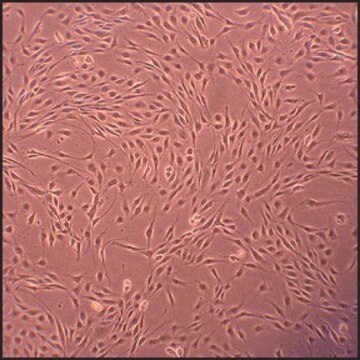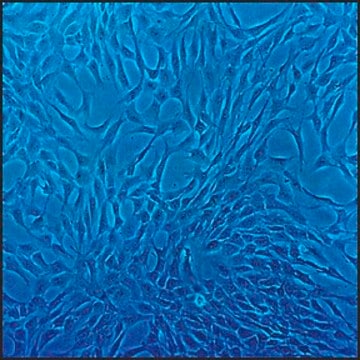CN402-05
Canine Chondrocytes: CnC (Cryovial)
Zaloguj sięWyświetlanie cen organizacyjnych i kontraktowych
About This Item
Kod UNSPSC:
41106514
NACRES:
NA.81
Polecane produkty
pochodzenie biologiczne
canine articular cartilage (normal)
opakowanie
pkg of 500,000 cells
producent / nazwa handlowa
Cell Applications, Inc
tryb wzrostu
Adherent
kariotyp
2n = 78
morfologia
chondrocyte
metody
cell culture | mammalian: suitable
powiązane choroby
arthritis
Warunki transportu
dry ice
temp. przechowywania
−196°C
Opis ogólny
Lot specific orders are not able to be placed through the web. Contact your local sales rep for more details.
Canine Chondrocytes (CnC) are derived from normal canine articular cartilage where they produce and maintain the extracellular matrix of cartilage. Following monolayer culturing, CnC can be grown in alginate microspheres to study chondrocyte proliferation and metabolism in a three-dimensional in vitro system. Alginate microspheres provide more physiological conditions for the chondrocytes and allow them to sustain normal proteoglycans production and retention. Because of the prevalence of degenerative joint disease in geriatric dogs, CnC can be a useful tool for veterinary practice.
Canine Chondrocytes (CnC) were utilized to evaluate anti-inflammatory and anti-oxidant activity of Glyco-Flex III (Yáñez, 2008) and trans-pterostilbene (Remsberg, 2008). They were also used in material studies aimed to develop optimal surfaces/scaffolds for engineered tissues, cellular arrays, biosensors and lab-on-chip devices (Wright, 2012; Shaik 2013a,b).
Canine Chondrocytes (CnC) are derived from normal canine articular cartilage where they produce and maintain the extracellular matrix of cartilage. Following monolayer culturing, CnC can be grown in alginate microspheres to study chondrocyte proliferation and metabolism in a three-dimensional in vitro system. Alginate microspheres provide more physiological conditions for the chondrocytes and allow them to sustain normal proteoglycans production and retention. Because of the prevalence of degenerative joint disease in geriatric dogs, CnC can be a useful tool for veterinary practice.
Canine Chondrocytes (CnC) were utilized to evaluate anti-inflammatory and anti-oxidant activity of Glyco-Flex III (Yáñez, 2008) and trans-pterostilbene (Remsberg, 2008). They were also used in material studies aimed to develop optimal surfaces/scaffolds for engineered tissues, cellular arrays, biosensors and lab-on-chip devices (Wright, 2012; Shaik 2013a,b).
Pochodzenie linii komórkowej
Cartilage
Zastosowanie
production and maintenance of extracellular matrix, cartilage, collagen, differentiation and de-differentiation, signal transduction, apoptosis, differentiation, drug screening, gene expression, cytokine production, agarose assays, chondrocyte adhesion to medical implants, scaffolds for cartilage regeneration
Komponenty
Canine Chondryocyte Basal Medium containing 10% FBS & 10% DMSO
Uwaga dotycząca przygotowania
- 1st passage, >500,000 cells in Canine Chondryocyte Basal Medium containing 10% FBS & 10% DMSO
- Can be cultured at least 10 doublings
Rutyna subkultury
Please refer to the CnC Culture Protocol.
This page may contain text that has been machine translated.
Kod klasy składowania
11 - Combustible Solids
Klasa zagrożenia wodnego (WGK)
WGK 3
Temperatura zapłonu (°F)
Not applicable
Temperatura zapłonu (°C)
Not applicable
Certyfikaty analizy (CoA)
Poszukaj Certyfikaty analizy (CoA), wpisując numer partii/serii produktów. Numery serii i partii można znaleźć na etykiecie produktu po słowach „seria” lub „partia”.
Masz już ten produkt?
Dokumenty związane z niedawno zakupionymi produktami zostały zamieszczone w Bibliotece dokumentów.
Nasz zespół naukowców ma doświadczenie we wszystkich obszarach badań, w tym w naukach przyrodniczych, materiałoznawstwie, syntezie chemicznej, chromatografii, analityce i wielu innych dziedzinach.
Skontaktuj się z zespołem ds. pomocy technicznej






